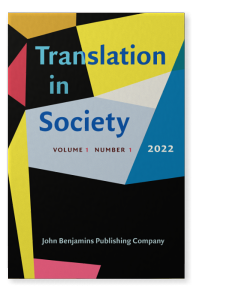Special Issue of ‘Translation in Society’ 2:1
Guest editors:
- Dilek Dizdar, dizdar@uni-mainz.de
- Tomasz Rozmysłowicz, tomasz.rozmyslowicz@univie.ac.at
The social world is not only a precondition for but itself a product of translation processes, as research into the role of translation in the construction of national or ethnic communities has shown (for example Brisset 1996; Cronin 1996; Venuti 1998; Kristmannsson 2005; Dizdar/Gipper/Schreiber 2015). However, translation – used here as an umbrella term for both translation and interpreting – plays an active part in the emergence of many more types of collectivities in various spheres of social life and on different levels of social organization: scientific communities (Stichweh 1984: 434), political movements (Tymoczko 2000; Baker 2013), religious gatherings (Hokkanen 2012), or multilingual dinner parties. How does translation contribute to the formation of these social entities? Are there identifiable general mechanisms and conditions at work? How does this contribution differ across social contexts, time, and space? And how can we conceptualize it?
This special issue invites contributions that focus on different forms and contexts in which translation enables and shapes the emergence of groups, movements and communities of any size, form and duration and/or plays a role in moving or dissolving borders between already established collectivities. Such a broad view also allows for the integration of questions which are of increasing academic and societal relevance: translation’s involvement in processes of bordering, inclusion and exclusion, participation, and other related issues. At the same time, this makes it possible to establish a basis for comparing different social configurations in terms of the impact of translation: for instance, how can the impact of translation on nation-building processes be compared to its role in the construction of scientific communities or political movements?
With a thematic focus at the intersection of sociology and translation studies, this special issue aims to contribute to a dialogue between the two disciplines. It invites papers with a focus on theory and methodology as well as empirical contributions. Suggested topics include, but are not limited to:
- The role of translation in the emergence of collectivities (scientific communities, political or religious movements, etc.)
- Translation and interpretation as a medium of societal participation and inclusion/exclusion (health services, political decision making, cultural events, etc.)
- Symbolic functions of translation for collectivities (minorities, supra- and transnational communities, etc.)
- Translation/interpreting as a practice of negotiating and marking linguistic and social belonging
- Situativeness and temporality of translation-based construction of collectivities (translation and interpreting in emergency situations, at spontaneous gatherings, etc.)
- Agents of translation-based collectivity construction (humans, machines, institutions, etc.)
- Relevant intersections between translation theory and social theory; conceptual and methodological issues for studying collectivities as outcomes of translation processes.
References
Brisset, Annie (1996): A sociocritique of translation: theatre and alterity in Québec, 1968-1988. Toronto: UTP.
Cronin, Michael (1996): Translating Ireland: Translation, Languages, Cultures. Cork: CUP.
Venuti, Lawrence (1998): The Scandals of Translation: Towards an Ethics of Difference. London/New York: Routledge.
Kristmannsson Gauti (2005): Literary Diplomacy: The Role of Translation in the Construction of National Literatures in Britain and Germany 1750-1830. 2 vol. Frankfurt am Main (et al.): Peter Lang.
Dizdar, Dilek/Gipper, Andreas/Schreiber, Michael (2015): Nationenbildung und Übersetzung. Berlin: Frank & Timme.
Stichweh, Rudolf (1984): Zur Entstehung des modernen Systems wissenschaftlicher Disziplinen. Physik in Deutschland 1740-1890. Frankfurt am Main: Suhrkamp.
Baker, Mona (2013). “Translation as an Alternative Space for Political Action”, in: Social Movement Studies 12:1, 23–47.
Tymoczko, Maria (2000): “Translation and Political Engagement”, in: The Translator 6:1, 23–47.
Hokkanen, Sari (2012): “Simultaneous Church Interpreting as Service”, in: Gonzalez, Luís Pérez/Susam-Sarajeva, Şebnem (eds.): Special Issue: Non-professionals translating and interpreting. Participatory and engaged perspectives. The Translator 18:4, 291–309.
Timeline:
Deadline for abstracts (400-500 words): 30 June 2021
Notification on abstracts: 30 July 2021
Submission of full papers: 28 February 2022
Notification of outcome of peer review: 30 June 2022
Revised versions: 15 September 2022
Final decision: 15 October 2022
Final manuscripts: 15 November 2022
Publication: 1 February 2023
Please find more information about the journal ‘Translation in Society’ at https://www.benjamins.com/catalog/tris.

